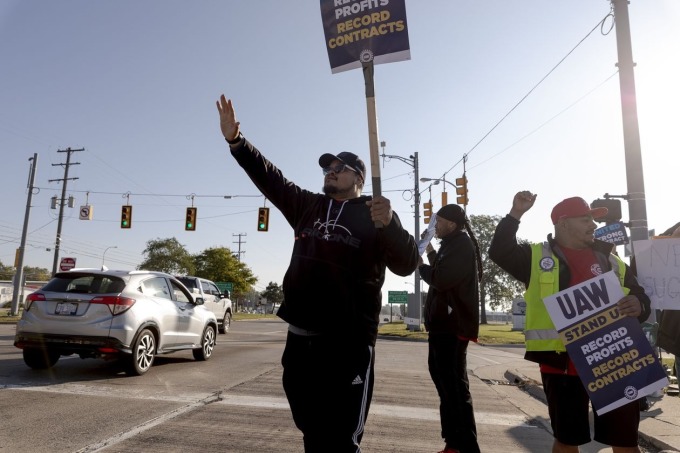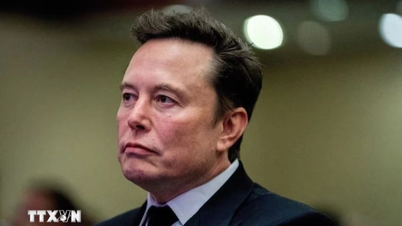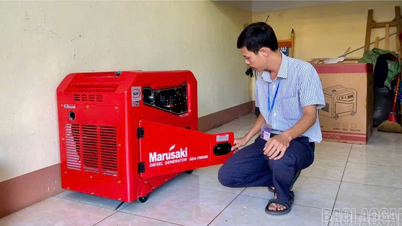If car companies in the US have to increase wages according to union demands, Tesla will have an even greater price advantage because it is outside this "wave".
On September 15, members of the United Auto Workers (UAW) union began a strike at factories of three automakers: General Motors, Ford Motor, and Stellantis.
Under pressure from unions, the three companies are expected to raise wages for workers. The question now is how much. So far, their proposals have not satisfied the unions.
The wage increases at these companies will give Tesla even more of a price advantage because they are outside this "wave" of wage increases.
Labor costs (including wages and benefits) for companies in Detroit (the center of US auto manufacturing) are estimated to average $66 an hour. Tesla's is $45. Wells Fargo estimates that if all of Fain's conditions are met, US automakers would have to increase labor costs to $136 an hour.

Workers outside a Ford factory in Detroit (Michigan, USA). Photo: WSJ
There are fundamental differences between Tesla workers and UAW workers. UAW members receive bonuses based on company profits. Tesla workers get stock options. Tesla’s stock has soared over the past few years, though it has also been volatile. This year, it has more than doubled.
Fain argued that the old labor contracts had not kept up with inflation, leaving their members worse off. Their sacrifices had helped automakers turn a profit in recent years. Ford later responded that the UAW’s demands were “more than double” its current labor costs. Its labor costs are also now higher than Tesla, Toyota, and many other foreign automakers in the US.
Many analysts now believe that American automakers will have to accept higher costs. “The bigger problem is that it will add pressure to the already difficult transition to electric vehicles,” Dan Levy, an analyst at Barclays, warned investors.
Last week, when asked about Tesla’s cost advantage, Fain also bristled. “I don’t care how many spaceships Elon Musk builds to go into space or anything like that. I care about the working class getting a fairer slice of the economic pie,” he said.
For years, American automakers have complained that Asian rivals, free from the UAW, benefit from cheap labor, which they say helps them keep prices down and attract buyers.
The UAW also tried to unionize Tesla when workers went on strike in 2017 and 2018, as the company, which has only one factory in San Francisco, struggled to produce the Model 3. Those efforts have so far been unsuccessful.
Musk also claimed that Tesla's stock options policy gives its workers the highest compensation in the industry, saying many workers "become millionaires from stock awards."
At Tesla, the average hourly wage for a factory technician is $23 to $32, according to the job search website Glassdoor. Tesla advertises jobs at its California factory that pay $24 to $67 an hour, plus bonuses, stock options and other benefits.
“We encourage listening to music and doing something fun. It’s important to make people want to come to work. We pay better than the UAW, and we’re more productive,” Musk said in a recent post on X.
Long-standing car companies in the US are also having to find ways to restructure costs while participating in the expensive transition from gasoline cars to electric cars.
In March, Musk announced plans to gain an advantage by reducing the cost of manufacturing future models by 50%, an ambitious goal that will require advanced technology and other changes.
Tesla’s CEO’s moves this year also show how the company can use its cost advantage to participate in a global price war. In July, Tesla announced a 20% increase in second-quarter profits, despite cutting vehicle prices since the beginning of the year. Meanwhile, with large losses from electric vehicles, Ford announced it would slow down the growth of this segment.
Over the past four years, UAW has increased wages by as much as 20%. However, UAW President Shawn Fain wants a raise of more than 30%, down from an initial demand of at least 40%. The union currently represents 146,000 auto workers in the US.
Ha Thu (according to WSJ)
Source link






![[Photo] Prime Minister Pham Minh Chinh chaired a meeting of the Steering Committee on the arrangement of public service units under ministries, branches and localities.](https://vphoto.vietnam.vn/thumb/1200x675/vietnam/resource/IMAGE/2025/10/06/1759767137532_dsc-8743-jpg.webp)
![[Photo] Prime Minister Pham Minh Chinh chairs a meeting of the Government Standing Committee to remove obstacles for projects.](https://vphoto.vietnam.vn/thumb/1200x675/vietnam/resource/IMAGE/2025/10/06/1759768638313_dsc-9023-jpg.webp)





























































































Comment (0)